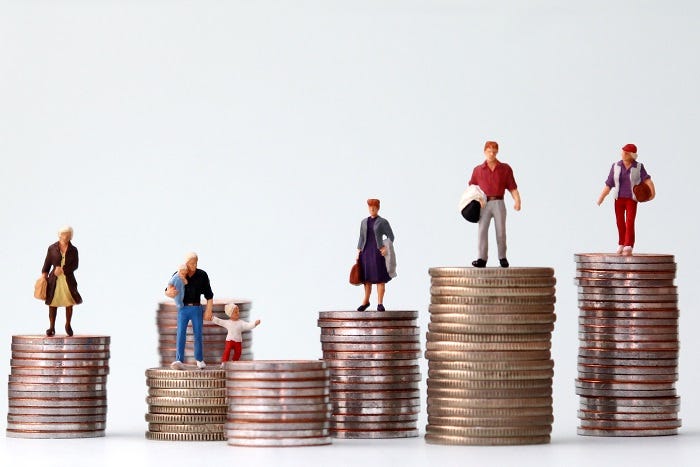Recipe for Democracy: Equity & The Economy
We reveal our true values through how we treat others and where we invest our time, money, and resources.
There is no better time to discuss equity and the economy than while fires ravage homes and memories in California. Why? Because determining whether the emergency response was a success will partially hinge on whether it is seen as equitable for all Californians and how it impacts the economy. It goes without saying that we face tough times ahead. Much has been written about the devastation L.A. County is facing, including issues of governance and leadership, climate and nature, and DEI (diversity, equity, and inclusion). I won’t add to the many explorations, investigations, and reporting already out in the world. Instead, I will share resources and continue to watch and learn how to support this evolving and devastating situation.
Equity is at the forefront of what some might call the Democrats' agenda. President Joe Biden has a section of the White House website dedicated to “Advancing Equity and Racial Justice through the Federal Government,” which covers topics from civil rights to housing justice and community investment. At least, that’s what their plans say.
Equity is often associated with buzzwords like (racial) justice, diversity, inclusion, and belonging. While the now-unpopular or controversial image of equality—giving everyone the same amount regardless of their individual needs—contrasts with equity, which means giving everyone what they need to be on equal footing, I think it’s a simple way to explain equity that even a kindergartner could understand. It can go further to suggest that liberation goes beyond equity and equality, because there is nothing like needing no support while still having the same clear view and path ahead as everyone else. But I’ll stick with the kindergarten definition for now. There are equity plans in every department, from the Department of Defense to the Department of the Interior to the Environmental Protection Agency to the Social Security Administration. Like democracy, equity is something that we practice. I’ve been watching The Equalizer TV show on Netflix, where all Queen Latifah does is level the playing field to pave the way for an equitable future. But it’s not as clear-cut as a TV show.
We are anticipating a shift away from civil liberties in the next administration. We can expect President-elect Trump to take a hard anti-DEI stance and attempt to penalize states that continue to support DEI education and policies. At the same time, I could see this administration focusing on bigger issues and allowing states to take the lead. Maybe this is optimistic. Since equity isn’t so much about specific policies as it is about setting a tone for policies—ranging from housing to healthcare to education—I think the best thing we can do is not be jerks to one another. We can support inclusive institutions and think freely. I’d ask myself; how do I demonstrate equity without explicitly saying it and spelling it out?
Who will be the key player in the next administration?
We will, and our representatives.
The economy is another massive force. It’s like a wave that can push us forward, drag us down, or splash us around. It includes our natural resources, both in terms of what we can export (like minerals) and how we can import goods (e.g., utilizing vast waterways for transportation). It also includes our hard work (labor) and our ability to manage these resources effectively (through markets, companies, and organizations). We have public companies, government entities, and privately owned businesses that coexist and interact.
You’ll hear different perspectives on what the economy will look like in the coming years. I’ve yet to hear one consistent prediction. Everyone is hoping for another banner year for the stock market, while also being wary of President-elect Trump’s erratic and unpredictable behavior, which makes some people love him, some fear him, and some hate him. He could damage economic relations with Canada and Mexico with tariffs or escalate the trade war with China. And don’t even think about what might happen to TikTok or the future of work (think jobs and AI). The economy is fickle. I think the concept of the invisible hand remains true—unseen forces move, poke, prod, and push the market, driving results and impacts on all of us.
I’ll be staying informed on any monopolies that big companies might attempt through mergers and acquisitions, as well as issues related to antitrust laws, consumer sentiment, and jobs reports.
Who will be the key player in the next administration?
Of course, we’ll care about the Chairman of the Board of Governors of the Federal Reserve System (currently Jerome Powell), since our financial interests and interest rates are tied to their decisions. The Department of Commerce and local chambers of commerce will also continue to play important roles in shaping economic opportunities.
Tax policies will be crucial—they can make or break companies and individuals. This is where one might say that shopping local matters: putting money where our values are and demonstrating what we care about through our purchases. These choices will define the direction of companies and the economy.
Cheers to showing the world what we are made of!
Additional Information
ACLU: Trump’s Attacks on DEI Reveal Administration's Agenda for Second Term
USA TODAY: Economy poised for a solid year in 2025. But these Trump plans could slow growth.
U.S. Department of State: Economic Prosperity and Trade Policy




